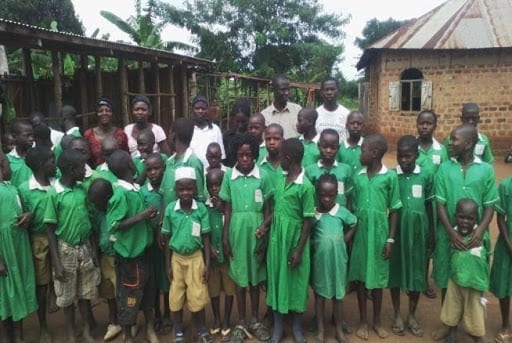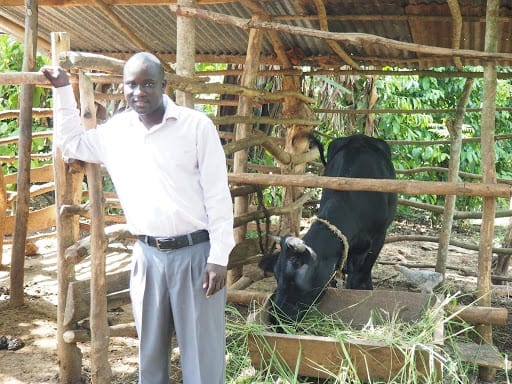How One Teacher in Uganda Is Educating His Community and Building a Business
Young people around the world are facing significant challenges as they enter the workforce, including lack of job opportunities and economic uncertainty. TechnoServe helps young people in the developing world access the information, capital, and markets they need to overcome tremendous obstacles and create their own economic opportunities. Today we are sharing the story of Kamya Yeseri, a young teacher in Uganda who used the skills he gained in a TechnoServe program to open a school in his community and build a business.

In 2012, Kamya Yeseri was working as a part-time teacher in Kayunga, a largely rural district in central Uganda. He was only earning $27.74 per month — that is, when the school could even afford to pay him — and had to maintain a small farm to supplement his income. Meanwhile, parents in the community struggled to afford their children’s school fees. “There was a need in the community,” Kamya recalls. “There was no nursery school here, so people were taking children very far for school.”
One day later that year, Kamya was walking home from the school when he met two TechnoServe business counselors who were training local youth as part of the Strengthening Rural Youth Development through Enterprise (STRYDE) program. The program, a partnership between TechnoServe and the Mastercard Foundation, equipped more than 68,000 youth with life skills and technical skills that allowed them to start and grow new enterprises.
After going through STRYDE, I realized I could use my background as a teacher to establish a good school.”
— Kamya Yeseri
After learning more about the STRYDE program, Kamya decided to join. He even mobilized a group of 25 other young people who also began receiving training. He soon began to shift the way he thought of himself and his opportunities in life. “[Before], I was teaching and I did not think of starting any business,” he explains. “I would just get money and then spend it. But the entrepreneurship training encouraged me to have a business of my own. I was inspired.”
Despite his excitement, Kamya did not know what kind of business to start. He developed a plan to grow and sell mushrooms — and even won some start-up funding from a business competition — but soon realized he didn’t have enough of the necessary skills to start the business. Using the market analysis skills he learned from STRYDE, he shifted course.
“After going through STRYDE, I realized I could use my background as a teacher to establish a good school,” Kamya says. “I could get something out of it in the form of a business and I could help my community at the same time.” And so he drew up a new business plan, for a local primary and nursery school.
Using the funds he won from the business plan competition, Kamya began construction on the school and started hiring staff. In 2013, he launched the Bright Future Junior School, which provides essential primary and nursery education for local students. In the first year, 22 students joined the school. As word spread, enrollment ballooned, until soon there were 202 students attending the Bright Future Junior School, grateful for the opportunity to attain a reasonably priced education within their own community.
Each quarter, Kamya now earns $333 on average and expects to earn more in the future as the school continues to expand. Additionally, the school employs eight youth, five of whom were STRYDE participants, and Kamya plans to employ and train even more. “Training youth is very important,” he explains. “When youth are talking to [other] youth, you are better able to communicate ideas. I have even learned from the youth I train!”

With the help of STRYDE’s business counselors, Kamya learned how to invest the new profits into his farm. He began growing pineapples intercropped with bananas and was able to buy two cows so that he could produce and sell milk locally. “The module on agribusiness has taken me from having a job as a teacher to investing in agriculture as a business. I’m now running my farm as a business,” he explains.
Today, Kamya’s farm is flourishing. He has six acres of pineapples and bananas at different stages of growth and employs three to five laborers on his farm, depending on the season. With the profits from his farm and the school, he was able to buy a motorcycle so that he could travel to further stretches of his farm and supervise his employees. He expects to earn over $8,330 from his enterprises in the next two years of harvest.
I want to show youth that you can work and also run a business. It is all possible.”
— Kamya Yeseri
Because of his work mobilizing one of the first STRYDE cohorts and incorporating the training into his own enterprises, he was even hired by TechnoServe as a business consultant for the STRYDE program so that he could continue spreading the curriculum to more youth in his area. When Kamya looks toward the future, he envisions growing both his farm and the school, while continuing to serve as a leader for rural youth in Uganda.
“I want to expand this business. My goal is also to be a role model,” he shares. “Me, I have a school, but I’m also able to farm and have a job with TechnoServe. I want to show youth that you can work and also run a business. It is all possible.”




